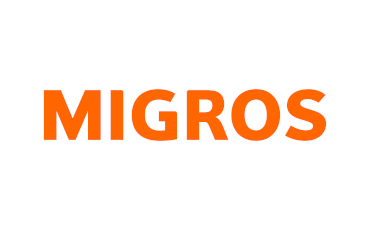Partnership with Migros Group 2023
The Migros Cooperative Alliance (‘Migros-Genossenschafts-Bund’, Migros) has been committed to helping the environment alongside WWF for more than 20 years. Since 2009, this cooperation has taken place as part of a comprehensive strategic partnership, which includes ambitious goals in the most relevant environmental areas.
To promote sustainable consumption in Switzerland and further improve Migros' environmental performance, WWF and Migros have extended their collaboration to the entire group of companies from 2023. In addition to Group-wide topics such as climate or deforestation-free supply chains, the focus is also on sustainability sprints with selected Migros Group companies.


CLIMATE AND ENERGY
By committing to the Science Based Targets initiative co-founded by WWF in 2020 and setting science-based targets for the climate, Migros has provided an important impetus for corporate climate commitment in Switzerland. Since committing to the SBTi, the Migros Group has been working on formulating detailed targets and measures that will help to deliver on the promises made. The new Group-wide reporting is not comparable with previous years. The targets were validated by SBTi for the first time in 2022. By 2025, all detailed targets, including the specific target of net zero for the SBTI commitment, should also have been validated by SBTi and are shown in detail here.
The Migros Group has also committed to qualitative targets that complement the SBTi Commitment. For example, an annual disclosure of the greenhouse gas inventory was agreed, which is implemented on the Migros web hub.
Reduction in greenhouse gases (scope 1 and 2) of 70% by 2030
Migros set the target of reducing greenhouse gas emissions by 70% by 2030 compared to figures recorded in 2019. CO2 emissions are measured in t CO2e. Included in the calculations is the global Migros Group.
Due to the expansion of the scope to include the Migros Group, the data cannot be compared with the previous year's figures.
The target was narrowly missed due to refrigerant leaks in one cooperative. The problem has been identified and will be addressed in 2024.
Reduction of CO2 Greenhouse gas emissions (Scope 3, Category 15) of 27.5% compared to 2019
Migros Group has set itself the target of reducing Migros Bank's emissions by 27.5% by 2030 compared to 2019.
It is not possible to calculate the financed emissions from the lending business and the assets managed by Migros Bank for 2023. The necessary data will be compiled in 2024 and will be included in the disclosure as far as possible. Further information can be found in the Migros Bank Sustainability Report.
Reduction of CO2 greenhouse gas emissions (Scope 3, Category 11) by 27.5% compared to 2019
The Migros Group has set itself the target of reducing emissions from the use of products sold by 27.5% by 2030 compared to 2019. This is a linear reduction path according to the wb2 degree scenario (2.5% per year from 2019 to 2030).
Reduction of CO2 greenhouse gas emissions (Scope 3, Category 4) by 27.5% compared to 2019
The Migros Group has set itself the target of reducing emissions from upstream goods transportation including air transport (Scope 3, Cat. 4) by 27.5% by 2030 compared to 2019. Migros will develop concrete interim targets by the end of the year. These can be reported for the 2024 reporting.
Reduction in CO2 greenhouse gas emissions (Scope 3, Category 1) compared to 2019
The Migros Group has set itself the target of 67% of its suppliers setting their own SBTs targets (measured in terms of non-FLAG GHG emissions) by 2026. As soon as this target has been validated by the SBTi, it will be reported here.
Furthermore, the Migros Group has made a commitment to the WWF to support suppliers so that they can achieve the target. On the one hand, Migros implements annual measures to facilitate access to the SBTi for suppliers. On the other hand, Migros supports its suppliers in implementing their SBTi targets.
In 2023, around 180 Migros Group suppliers who do not yet have SBTi targets were contacted and subsequently informed in webinars about how to achieve their own SBTi targets. A next series of webinars is planned for 2024.
As part of the climate table, several meetings were held to further develop the climate protection industry platform. This lays the foundation for the implementation and financing of climate protection projects in Swiss agriculture.
Both goals agreed with the WWF were thus fulfilled.
Reduction in air transport emissions
In addition to the SBTi Engageement of the Group, Migros has set the target of reducing its air transport emissions by 8'750t CO2e by 2025 compared to figures recorded in 2018. This includes supermarkets/consumer stores, and specialist stores, food and non-food products, but excludes cut flowers.
In 2023, Migros’ absolute CO2e emissions from goods transported by air were 25'731t CO2e. Migros has thus exceeded the set target. A contribution is paid into the Migros climate fund for all air transportation. This creates an additional internal incentive to avoid air transportation.

BIODIVERSITY
As part of the commitment to deforestation- and conversion-free supply chains published in 2023, Migros is changing its reporting.
100% certification of all procured volumes of high-risk commodities in own-brand products
For the first time, a certification target for key high-risk goods will be reported for 2023. The raw materials in the scope are cocoa, cocoa butter, coffee, palm oil and palm kernel oil, soy, beef. Only the own industry is taken into account for palm derivatives. This produces (71% of the relevant share of sales in the "Washing/cleaning", "Personal hygiene", "Selfcare" and "Beauty" product ranges).

